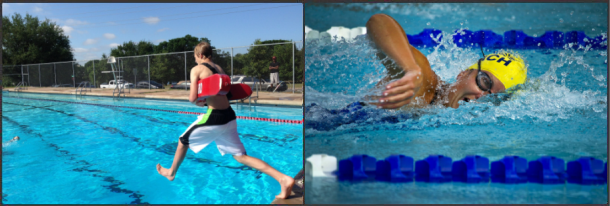A person with a higher amount of body fat will float better in comparison to a person who is leaner and more muscular.
This is because fat is less dense than water, which also means that it floats better. Muscle is denser than water, and thus it will sink quicker. Muscular or lean people will not find it as easy to float.
Certain factors will enable some to float better than others, and certain aspects of the water itself will also have an influence.
Floating factors:
– the percentage of body fat and muscle
– how much air is in your lungs
– fluids, blood and water weight
– salt content in water
Overall it will come down to the person’s body composition, whether they float or sink in water.
Is it easier to float in freshwater or saltwater?
Floating in salt water is easier than in freshwater because of the difference in density. Saltwater has a higher density, meaning it will be easier to float in saltwater than in freshwater. The higher density of salt water gives more buoyancy. Buoyancy is what enables your body to float in water.

Why am I not able to float in water?
People with smaller or more muscular bodies will have problems floating. Muscles are denser than water; thus, like a rock, you would much quicker sink rather than float.
How to float in water
As previously mentioned, some people will find it easier to float in water than others. It all comes down to the relative density of one’s body. Relative density is the ratio of the body in the air in comparison to the weight of the body when in water.
But even though some may find it more difficult to float, everybody can still float. Through practice, one can learn more about how their body behaves in water and how to control your body to float.
1. Face down floating/deadman floating
Floating face down will help you watch how your body behaves in water. If your legs start to sink, slowly pick them up. All you have to do is take a deep breath and submerge your face in the water while slowly lifting your legs. A slow breaststroke may help you get a better feel of the water.
2. Pushing and gliding

For this exercise, push away from the pool wall and glide as far as possible. Ensure that your body is stretched out properly to form a nice streamline. Check which small movements help you glide better.
3. Pushing and gliding + kicking
This is the same exercise as number 2, with an additional kicking motion to help you float or glide better.
4. Upwards push and glide

This is similar to the exercises before, except you now face upwards, and the head is no longer submerged in water. After you have pushed away from the pool wall, you can kick a little to give yourself more extended momentum.
Different styles of floating
1. Horizontal survival float or deadman floating

This position is when you lay face down in the water. Both arms and legs are spread out to create more surface area and thus maximize buoyancy. To inhale, push yourself, using your arms, out of the water and submerge your head again.
From all the different positions, this one saves the most energy.
2. Vertical survival float

This position is suitable for leaner or more muscular people who struggle to float. It is like you’re standing in the water, your body vertical in the water and your head above the surface. Your arms are in a relaxed position, typically a little bent. The legs are also slightly bent, possibly moving them a little now and then.
3. Back float

This position requires a bit more energy as you must try to keep your head afloat. It is used for shorter periods. It is the same as the deadman float, just that you’ll be facing up. You can use your arms and legs and move them in a circular motion to stay afloat easier. This is the best for water with a high salinity percentage.
4. Treading water

This position is similar to the vertical survival float. The only difference is that there is more movement. It helps swimmers check their surroundings. To stay afloat, you wave your arms in a figure-eight pattern, and the legs are supposed to imitate the pedalling of a bicycle.
In conclusion
Floating is possible for anyone. Some might find it easier to float due to their body composition. People with more body fat will find it easier to float than muscular people. But with enough practice, everybody can float.

Lifeguard Services
Lifeguard services provide an easy way to hire a fully qualified lifeguard for permanent, short and long-term hire. We provide an easy way to make sure your allocated water is in safe hands. We can come to your school, outdoor event, party and more. To find out more and book, please see our booking page.




Leave a Reply